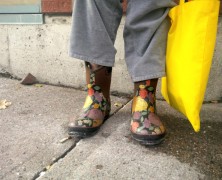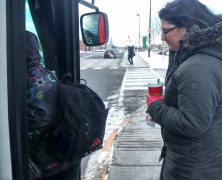By Jesse Winter And just like that, it’s winter. The recent snowfall across Ottawa and the province has, in typical early-winter fashion, sent drivers skidding, sliding and scrambling to any tire shop they can find to get snow tires installed. The rush is as predictable as the first snowfall itself, but for Shaheen Kahn, that doesn’t make the pre-Christmas pressure any less manic. “It’s 18-hour days and then you just drop,” said Khan, a manager at Ottawa Tires Direct. “The snow made it like an avalanche. All the people who were on the fence jumped,” he said. Right now, his shop is doing 60 to 70 snow tire installations a day between their two Ottawa locations. The wait time is about a week, but in order to pull it off, Khan said his crews are going flat out. “We work from 7 a.m. to 1 a.m. every day. Some shops are only open during regular business hours, so their wait times are more like two to three weeks,” he said. At the tire shop’s Scott Street location, anxious customers pile up in the waiting area while the phones ring continuously. Khan’s desk is stacked many feet deep with work orders, and he juggles taking calls from his office phone and cell at the same time. When a customer calls to make an appointment, the answering machine asks them to instead send Khan a text message because the shop is so swamped. Khan’s company rented out the house next to their workshop, and converted it into a “war room.” Boxes of newly delivered rims are stacked in the living room, and the dining area has been pressed into service as a command centre where Khan’s colleagues track everything with spreadsheets. Unprocessed work orders are stuck to the walls and even the ceiling in an effort to maximize space. The kitchen is the only space that isn’t taken over with boxes. “It will be soon, though,” Khan said. “The real craziness hasn’t even begun yet.” Winter tires aren’t mandatory in Ontario, but as Ottawa Police Sgt. Mark Gatien explained, the first snow of the season always takes drivers by surprise. “One of the issues I’ve noticed, and I even saw this myself a couple of times this morning, is people taking corners like it’s still summertime,” Gatien said. “You can watch it unfolding on the road right in front of you, watching someone go into a corner way too fast and then, whoa, all of a sudden they’re in the ditch and they can’t understand why. It happens every year, and it baffles me,” he said. Over the past two days, Ottawa drivers have escaped relatively unscathed from the worst of the recent snow squalls. There were only 15 crashes after Monday’s flurries, but that’s about average for the city, said police spokesman Const. Marc Soucy. Farther west, however, the province is being walloped by a winter storm that has closed roads and forced police to issue bad weather advisories. Near Huntsville, for example, the storm is so bad that the Ministry of Transportation had to pull the snowplows off the highways on Tuesday. According to OPP spokesman Sgt. Peter Leon, bad winter weather often causes spikes in collisions and vehicles in the ditch. By 10 a.m. on Tuesday, police near Orillia were already dealing with a 200 per cent increase in calls. Near North Bay, the cops had more than two-dozen active accident scenes on their hands, and many more were expected. “Based on what we’re seeing on the weather radar, it’s only going to get worse,” Leon said. Back in Ottawa, Sgt. Gatien said that while the city experienced a lighter snowfall so far, that lucky streak won’t last and drivers need to be prepared. “It’s been proven that winter tires give you better shopping distance and traction,” Gatien said. “Sometimes people just can’t afford to have two...
Ottawa shows its winter feet...
By Laurène Jardin Jack Frost nipped at Ottawa’s toes on Tuesday. Car owners scurried to change their summer tires, cyclists changed gears on bikes, and bulldozers cleared the streets in the early hours of the morning. The one thing that united Ottawa residents was the recognition that it was time to change to winter footwear. The Gridlock took to the streets to find out what Ottawans were wearing to keep their toes warm during the coldest day of, what is technically, fall. THE SPECIALIST Paul Shields has owned the Glebe Trotters shoe store since 1993. He is a boot guru, and on days like Tuesday, he is a major asset for the store. Shields imagined that he would have a busy day set out for him after Monday night’s snowfall. Still, the biggest day was last week. “We’ve had some pretty big days already,” he said. “A lot of people buy boots based on the year before, especially if it’s a hard long winter,” he said. “So we don’t even have to get snow to get the ball rolling.” In the following clip Shields shares tips for those on hunt to buy the best boots. THE VOLUNTEER On Tuesday morning, Susie Peters purchased a pair of winter gloves for a homeless man. Winter equipment like gloves and boots are important to Peters. Peters is a volunteer at The Well in Ottawa, a day shelter that hosts women. It is organized by the Church of St. John the Evangelist. Peters’ attitude was so positive that it was very difficult to tell that she had a disability. Winter is not the biggest issue for Peters. “I’m on ODSP (Ontario Disability Support Program), and when my friends whine about how little money we have, I have to...
Algonquin College students vote on U-Pass...
By Eddie Ameh Algonquin College students are voting in a week-long referendum to accept or reject the Universal Transit Pass (U-Pass) system. If they vote to accept it, students will pay a one-time discounted transit fare at the beginning of every school year. “After seeing it positively affect students of Carleton, U-Ottawa, St. Paul University and even universities in Manitoba and British Columbia, the Universal Transit Pass system would be a great way to provide affordable and accessible transportation to our full-time students,” said Mackenzie Campbell, vice-president of the students’ association. Campbell said that two years ago OC Transpo put an age cap on student monthly passes, so students over 18 no longer qualified for student passes. Since then Algonquin students over 18 pay almost $100 a month for a bus pass, almost twice the cost of a U-Pass. “The students who take the bus on a regular basis will be getting about 50 per cent discount average from the regular adult monthly pass,” Campbell said. In the first 24 hours of the week-long vote more than 25 per cent of students had already voted — a figure Campbell said is very encouraging. Kyle Waddell, a first-year student, said he voted in favour of the U-Pass because it will help him save a lot more money. “With the U-Pass, you pay at the beginning and you just show your pass. And it’s cheaper.” Student Marleigh Cheaney said the U-Pass would help students because they have other expenses including rent and books. “I think this would be a great opportunity to help students save a little extra money,” she said. Emily Langan, a first-year student, said a U-Pass will be more convenient and cheaper, especially as it comes with the tuition fees. She also...
Warmth or safety: digging through Carleton’s tunnels...
By Nicole Rutherford To combat the cold, Carleton’s students are starting to head underground into the labyrinth of tunnels that connect the campus—but for some students warmth often takes priority over safety. “I don’t feel safe, and as a matter of fact I found myself looking for cameras,” said June Cummings, a frequent tunnel traveller. “We’ve always commented about being alone as women.” In the several kilometres of underground pathways, there are only seven security cameras and other minimal security features. This was revealed after July’s incident of an unidentified man posting a video to YouTube riding a motorcycle through the tunnels. At the time of publication, the university’s director of security, Allan Burns, had not confirmed whether the culprit had ever been identified. Burns responded to questions by email about security measures and why there are only seven cameras in the tunnels. “We are constantly assessing our physical security requirements to ensure we are meeting the needs of the community and are reviewing camera requirements in the tunnels as part of the assessment.” Other security features in the tunnels include mirrors for going around corners and assistant telephones—free phones located throughout the tunnels that call campus security. Carleton student Mack Holliday feels that these phones are more than enough to feel safe. “They’re more secure. I’m usually with a friend in the tunnel. I’m also a bigger guy, so I’m not really that worried.” In general, female students were not so certain. “It would probably make me feel more at ease if you would see a security guard come by every once in a while, especially when 9 o’clock classes let out,” said student Jessica Ranieri. In his email, Burns wrote that security “officers patrol the tunnels on a regular basis and we’ve...
OC Transpo low-income community pass needed by Ottawa’s most vulnerable...
By Evelyn Harford OC Transpo has the highest single-ride adult fare in Canada. As fares rise in the city of Ottawa, OC Transpo has had very limited discounts for homeless and low-income people for the last two years. Catherine McKenney, councillor-elect for Somerset ward, wants to change that. “The one thing I will be looking at around transit is the reinstatement of the community bus pass for low-income residents,” said McKenney. “I think it’s important. I think it disproportionately affects our most vulnerable residents.” Right now the only homeless or low-income people who qualify for a break on transit fares are those who have a physical or intellectual disability. A review of the OC Transpo annual reports from 2009-2012 and a City of Ottawa report on poverty in 2010 shows that approximately 60,000 OC Transpo riders are below the low-income cut-off. During the recent municipal election in Ottawa some candidates heard demands for lower fares. “When I was out campaigning I visited different shelters,” said McKenney. “It is the number one issue I heard from folks. They have no options to get anywhere in the city without a community bus pass.” OC Transpo first introduced a community pass in 2006. David Chernushenko, city councillor for Capital ward said at some point between 2011-2012 the eligibility requirements for the community pass changed. The pass would no longer be available for people based on their income status alone. The discounted OC Transpo monthly community pass, currently costs $40.75 compared to $100.75 for the regular adult monthly pass. The city budget will be tabled in January, 2015 and Chernushenko expects this issue will be raised during the budget deliberations. “I do feel the city can and should look to find simpler to ways for people of a demonstrably lower income to get passes or tickets at a lower fare.” But Chernushenko said it won’t be easy given the budget cuts from the province. “It is a challenge. It represents new money. It represents the city finding money to offer those passes at a discounted rate that we haven’t currently budgeted for. So that does mean a tax increase or money taken from somewhere else,” said Chernushenko. “It’s bad,” said Rafael Custas, referring to the regular $100.75 adult monthly pass. “I just cannot buy it.” Custas arrived from Honduras six months ago and has been able to hold a part-time job. However, the high cost of transit has made it difficult for him to work full-time hours. Although a federal tax credit of 15 per cent is offered to those purchasing monthly passes, Custas say that this is not enough. Homeless and low-income individuals rely on the Ottawa Mission’s free bus tickets. These are for people who can prove that they have an appointment with social services, which is not within walking distance of the city centre. “While the cost of public transportation is a significant challenge for municipalities, it is critical to seek ways to make public transit more affordable for low income residents as an important strategy to improve their situation,” said the most recent City of Ottawa report on poverty. OC Transpo has not yet provided an official response on this matter. John O’Hara, a regular at St. Joseph’s Parish for the free meals offered daily, said that if people can’t afford groceries, they can’t afford a monthly pass at the regular fare. “They’re just not giving us enough money to live on,” O’Hara said, “Give me a community pass.” |Create...





